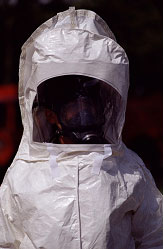| |  Bioterrorism, Biodefense, and Health Security Biological terrorism -- the threat or intentional release of biological pathogens -- presents a unique set of foreign policy challenges. The speed of modern international trade and travel can facilitate the movement of biological pathogens (including dangerous viruses, bacteria, and toxins such as smallpox, anthrax, plague, tularemia, and viral hemorrhagic fevers) across national borders -- with significant impact on health, economies, and national security. Biological terrorism -- the threat or intentional release of biological pathogens -- presents a unique set of foreign policy challenges. The speed of modern international trade and travel can facilitate the movement of biological pathogens (including dangerous viruses, bacteria, and toxins such as smallpox, anthrax, plague, tularemia, and viral hemorrhagic fevers) across national borders -- with significant impact on health, economies, and national security.
Compared to other forms of terrorism, bioterror attacks can be relatively low cost and easily replicated in multiple sites. Attacks involving a highly infectious agent in a densely populated area could spread quickly, and infectious disease can cross national borders to infect unprotected populations. Further, the public health sector's central role in detecting and responding to a bioterror attack requires different strategies and a different combination of actors than do responses to other forms of terrorism. In the case of a deliberately-induced disease outbreak, governments must decide how to cooperate to limit the international spread of disease and develop effective response and recovery mechanisms.
Black Ice (Bioterrorism International Coordination Exercise)
Global Health Security Action Group (GHSAG)
- GHSAG Ministerial Statement - November 2005, Rome, Italy
- GHSAG Ministerial Statement -- December 2004, Paris, France
- GHSAG Ministerial Statement -- November 2003, Berlin, Germany
- GHSAG Ministerial Statement -- December 2002, Mexico City, Mexico
- GHSAG Ministerial Statement -- March 2002, London, United Kingdom
- GHSAG Ministerial Statement -- November 2001, Ottawa, Canada
Related Links
| | | Highlights | Diplomacy to Advance Food Defense
Marc L. Ostfield, Senior Advisor for Bioterrorism, Biodefense, and Health Security, OES. (9/1): "There is a genuine terrorist threat to the global food supply, both at the production and processing stages. Evidence indicates that terrorist groups have considered the food supply as a target for bioterrorism." full text
Food Defense: The Vital Role of International Cooperation
Marc L. Ostfield, Senior Advisor for Bioterrorism, Biodefense, and Health Security, OES. (6/28): "There are many steps nations can and have taken individually and collectively to better enhance national and international food defense." full text
Global Progress on Biosecurity: U.S. Vision and International Efforts
At a meeting about partnerships for global security, sponsored by the Carnegie Endowment for International Peace in Washington, DC, OES's Marc Ostfield gave a presentation on Developing Options for Global Biosecurity: Assessing Progress and Evaluating New Mechanisms March 6, 2007. full text |
|
